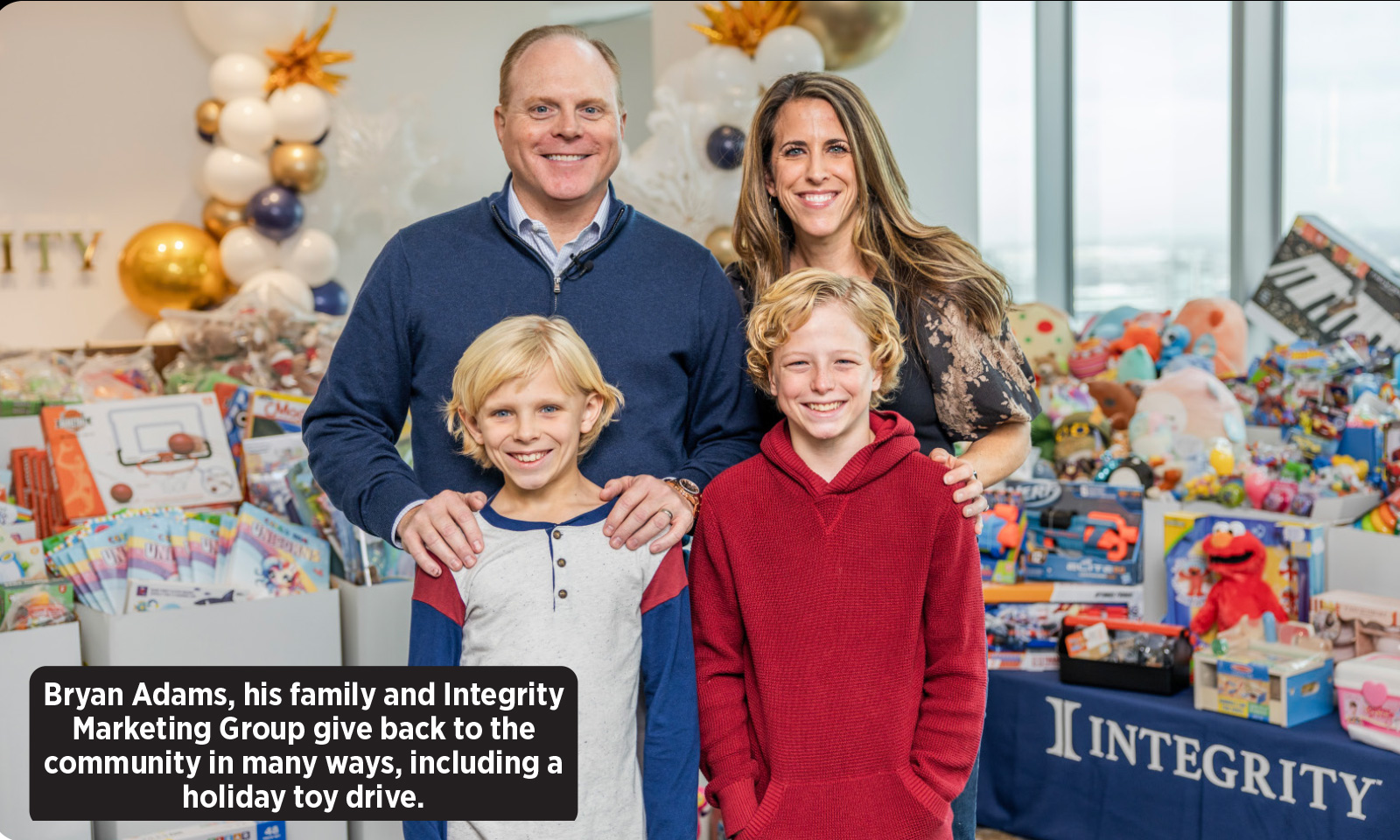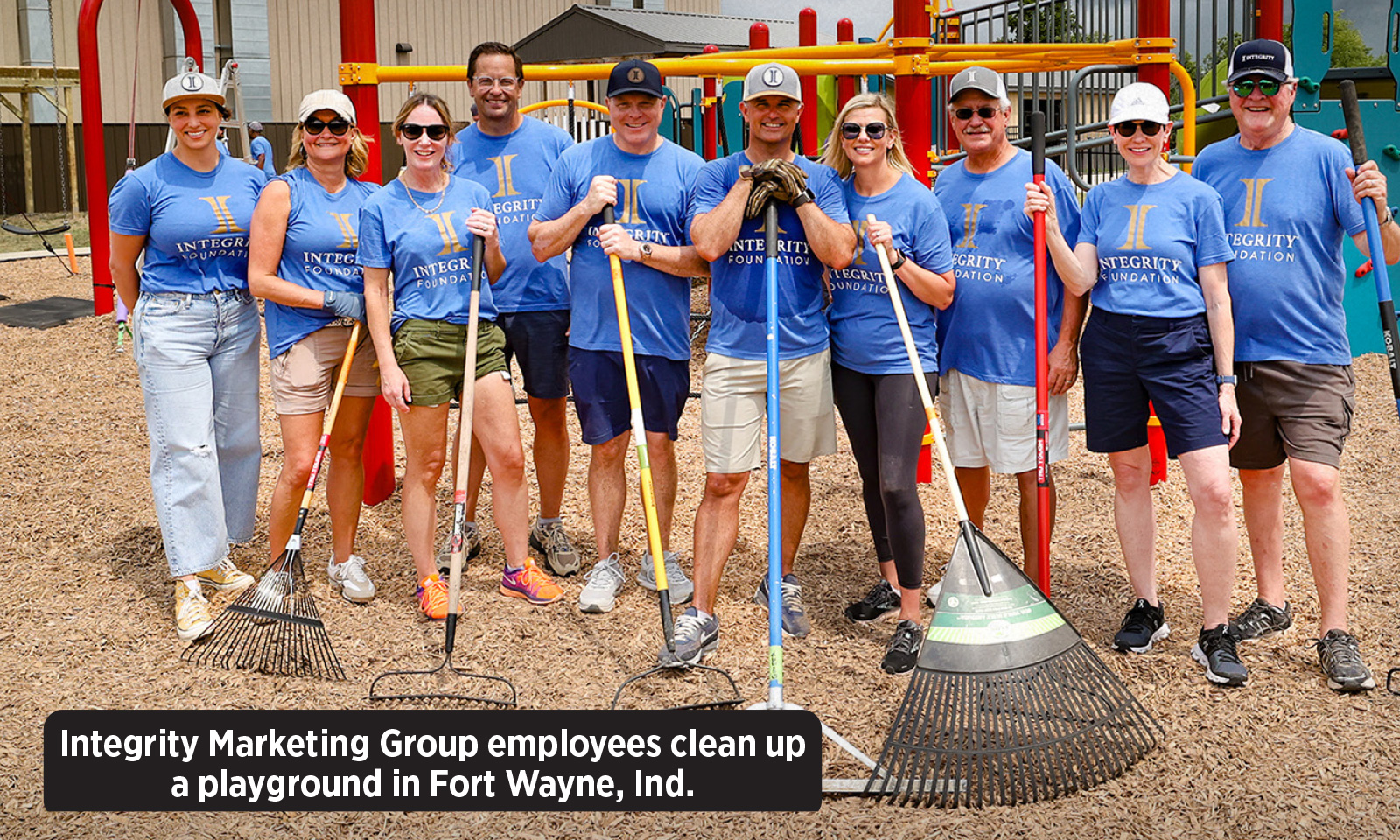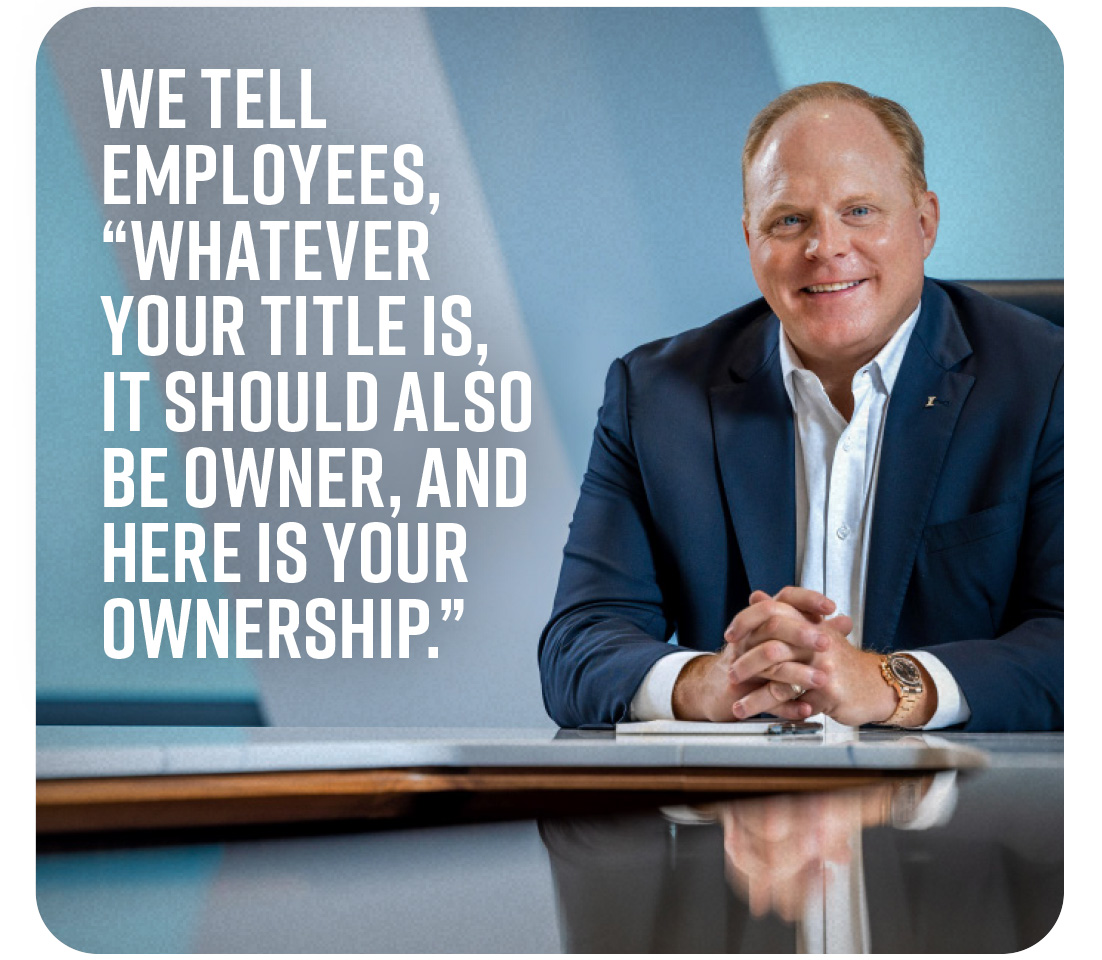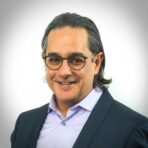An incredible ride — With Integrity CEO Bryan Adams
Integrity Marketing Group may not have started in 2006 had it not been for Bryan Adams’ job folding shirts in a shopping mall clothing store while in college.
“One day, I was standing there and saw a sharply dressed guy — I’ll never forget him — gray suit, red tie, white shirt. He looked like a million bucks. And he’s just the friendliest guy in the world. He said to me, ‘You seem pretty good with people, you ought to come work for me.’ And I asked, ‘What do you do?’ And he answered, ‘I sell life insurance.’”
“If that guy, Gary, hadn’t asked me to do that, I don’t know where my life would be today,” Adams said.
Today Integrity Marketing Group is the nation’s leading independent distributor of life and health insurance products, and recently launched Integrity Wealth, now valued at about $50 billion.
In this interview with InsuranceNewsNet Publisher Paul Feldman, Integrity Marketing Group's co-founder and CEO Adams describes how Integrity has “partnered” with many firms and agencies, acquiring new talent and skills as it has built both capabilities and value, and, in the process, created an industry leader.
Paul Feldman: Tell us a little bit about yourself, and how you got into the industry.
Bryan Adams: I grew up in a small town of about 1,800 people in West Texas. My mom and dad owned three funeral homes. There’s nothing like growing up in the 1970s and ’80s with the last name of Adams and your family owns funeral homes. My sister and I worked at the funeral homes ever since we could open the door, literally — we would welcome people in. And I was washing cars, mowing lawns, cleaning caskets, all of that.I ended up spending a lot of time with people within the investment part of the company I was with. I spent time with people in corporate finance, actuarial people, as well as distribution and marketing people. I connected with and enjoyed working with people within marketing and distribution because it was all about business development and how you can leverage technology for the betterment of your business.
For my dad, it was a calling to serve people. For my mom, it was much more of, “OK, well, let’s make sure we take care of not only everybody else’s family but our family, too.” My mom and dad worked all the time. There were a lot of times we didn’t have dinner together because there were visitations, etc.
Sometimes my mom and dad would say, “I can’t believe that family didn’t have any plans in place.” I remember those conversations. I was probably 9 years old when my parents were talking about a family in town who had done pretty well, but their loved one passed away, and they couldn’t pay for the funeral.
And my dad said, “Don’t worry about it, we’ll figure this out.” My mom was like, “OK, again, we need to provide for our family, so how are they going to pay for it?” And there would be this natural tension between the two of them.
I remember at an early age I asked, “Why don’t more people plan for this if they know it’s going to happen? It’s inevitable that we’re all going to pass away.” And my dad said — I think he quoted Winston Churchill — “Because Americans are the only society on earth that believes that death is optional.” And you would see families who had life insurance and how much easier it was for them — the relief in those families was evident.
Later, when I was in college at Texas Tech, I was working in the mall in retail. I was the guy who was folding the shirts. You would come in, look around, and you’d kind of mess them up, and I’d be like, “Oh, my God, I’ve got to fold them again.” To this day, I can fold a shirt faster and straighter than most people, because I folded so many pants and shirts in that job.
One day, I was standing there and a sharply dressed guy — I’ll never forget him — gray suit, red tie, white shirt. He looked like a million bucks. And he’s just the friendliest guy in the world. He said to me, “You seem pretty good with people, you ought to come work for me.” And I asked, “What do you do?” And he answered, “I sell life insurance.” And I said, “Man, listen, I grew up in a funeral home, and I’ve been wondering this my whole life. Why don’t more people own life insurance?” And he said, “Well, that’s what we do, we give people peace of mind.” So I went to work with him.
Back in those days, you were walking door to door and trying to get in to tell people about what we were offering. But I had this passion. I could say, “Look, I grew up seeing the issues when someone didn’t have life insurance, and I can help you with this.” I had some early success with that. After college, I went to work for the investment group that owned those insurance companies. The rest is history. It has been my passion to help people.
Feldman: How did you start Integrity? Where did it all begin?
Adams: I started this out of my house. I started with my dog — he’s no longer with us — literally under my desk. I worked out of my house for a long time. When I got married, I had six people working in cubicles in the house. My wife and I dated for a couple of years, so she was accustomed to the situation. She was cool for about the first year, and then she said, “OK, I think it’s about time for you to get an office.” It has been an incredible ride. I pinch myself every day.
Now, we’re serving people holistically. There’s a huge need for people to be served holistically with their life, health and wealth needs. That’s really the genesis of how we started Integrity. It was those early days understanding that people need what we do. We’re in one of the most noble professions in the world. We serve people in their most important times. And everybody wins. The carrier wins, agents win, agencies win — ultimately the consumer must win, first and foremost. It’s a virtuous business, a noble profession and I’m proud to be part of it.
Feldman: Integrity is one of the largest distributors in the United States. Tell us about your distribution and how you cover other markets, because it’s not just life insurance, health insurance and annuities. Now you also have Integrity Wealth.
Adams: We’re passionate about the wealth business today. We believe that most Americans don’t have great access to wealth advisement. I think a lot of the bigger banks and institutions want to focus on the ultrahigh net worth. But most of our clients — the everyday people, like my family — don’t get great service in wealth advisement. We think that there’s a way for us to help them plan for the good days ahead in their retirement.
As you get older, there are two main concerns that people have: their health and their wealth. Your health may determine where you might rank those two. If you’re older and you’re healthy, then you tend to be focused on how to maintain your wealth. If, all of a sudden, you have a health issue that pops up, then it’s, “OK, gosh, do I have the right health insurance product? And how am I going to move on from this event to make sure that I live a long and healthy life?”
Also, people inherently want to leave a legacy and be remembered long after they’re gone. We’re able to do that with life insurance. Life insurance is one of the greatest tools to help people leave a legacy, whether that’s planning for your final expenses or for estate planning — or everything in between. We have so many incredible resources and products, and incredible carrier partners that we work with on providing those.
A lot of our businesses had been involved in the wealth management business with their own broker-dealer or registered investment advisor. We decided to bring those broker-dealers and RIAs together under one roof with Integrity Wealth. That enables us to leverage all those different capabilities — so that everybody has the best-in-class technology, service, custodians and resources; and so that we can make sure that we’re giving everyday Americans the best world-class wealth management resources. We’re able to give them those resources that you would get at any large institution or big bank. Now, we’re able to meet them and give them even better coverage on their wealth side as well. We have decades of experience through our partners. We’re excited because now we’re able to leverage all those different capabilities, and our size and scale, to give people more options and ultimately serve them better.
Feldman: How do you see wealth management evolving? How has it evolved in recent years?
Adams: We’re incredibly excited. In fact, we just brought in a new president for Integrity Wealth, Craig Walling. He has tremendous experience in the industry and has done some amazing things, including heading UBS Private Wealth. One of the things we wanted to do is holistically serve people with their life, health and wealth, and do that by using a lot of our technological resources. Two and a half years ago, we had zero wealth assets; today, in aggregate, we have almost $50 billion of assets that we’re helping people with. We think that we’re just beginning that journey. It’s a big opportunity for us to meet people where they are.
With the millions of customers that we’re already serving, and the hundreds of thousands of agents that we help on a day-to-day basis, we think that there’s a big need for us to be able to serve our agents. We’re looking at opportunities to help them get dual registered and get licensed in the wealth space, if they choose. We have world-class resources to be able to do that. In addition, we think that there’s an incredible opportunity for us to leverage our platform to bring in other wealth managers, to be able to leverage our technology, our resources. We want to meet customers wherever they are. We’re just getting started on that, and that’s a big part of where we’re going from here.
Feldman: I know you’re working to bring new people to the industry. Most organizations only want to work with somebody who’s already in the business, and those people just go from marketing organization to marketing organization.
Adams: Most people think that this is a male-dominated industry, and I think it has been for a long time. One of the things I can say about Integrity, more than half of my executive team are female and diverse. If you look at our workforce, 63% of our employees are female — more than half of our customers are female. If you look at our agent base — we have the largest agent base in the country — 46% are female, which is incredible, and 40% of them are from minority communities. We’re meeting people where they need to be met in their communities; we’re incredibly passionate about that, and I think we’re truly changing the industry in so many ways for the better.
We want to serve all Americans. I mean, I’ve gone through this with my mom and dad. My dad’s gone through some health issues recently. As we’re going through it, my dad is being taken care of with incredible Medicare products that we created. He has great long-term care insurance. He’s not in a nursing home, but in case he ever is, he had the foresight to buy that policy 25 years ago. He has great life insurance coverage through our organization, he has annuity products for his wealth management and he also has wealth management products. As I’m looking at this from my mom and dad’s situation, as the one who manages a lot of that for them, well, that’s another reason I look at it and say, “There must be holistic planning.”
As these things happen, I need to explain it to my mom. Sitting down with my mom, who is one of the smartest people I’ve ever met, she’ll ask me — because these are complex situations — “Are we going to be OK?” And I say, “Well, let me break this down for you.” And it’s something I’m incredibly passionate about, because we want to make sure that everybody’s taken care of and everybody’s invited into this process, because everybody’s going to be impacted. Whether it’s your health insurance, your life insurance or your wealth management, everybody’s impacted.
We just need to make it simpler, easier to understand, and, ultimately, more human. So people know they’re being seen and understood and we’re not just selling some product to sell a product. These are products that they’re going to need at some point, and I’m living through this with my parents today.
Feldman: Mergers and acquisitions have been an important driver for Integrity. How do you see that playing out in the future?
Adams: We never acquired companies just to acquire companies. We are very strategic at partnering with people. And we don’t call it “M&A” or “acquiring,” we call it “partnering.” It’s how I started Integrity in the beginning with this idea, in 2006, and my two co-founders and I came up with this concept. We thought if we all keep on beating each other up and trying to fight for every last nickel and dime, it’s going to be a race to the bottom. But if we all come together, the rising tide will raise all boats. I fundamentally believe that. That’s where we created Integrity, with this idea that let’s all work together and serve more people and leverage our scale and size.
We didn’t do that with the idea of acquiring businesses; that kind of happened later as people started needing succession planning, etc. But what we found is that if you find people that have the best distribution, you have the best resources, you have the best products and services in the best geography. By coming together, we can serve people holistically, and we can do that anywhere in the U.S. So, it has been an important part of our being able to bring in new capabilities in data and market research, like we’ve done with some of our businesses, marketing advertising with Thomas Arts, with some of the technology businesses we’ve partnered with. Product development, like Annexus, which is an incredible product development business — Ron Shurts is one of the most incredible leaders.
Mike White innovated the Medicare space with AIMC and developed a lot of Medicare supplement products. Tim Ash has really perfected the institutional service of clients and organizations with Ash Brokerage. I mean, we brought in so many incredible partners with the idea that one plus one equals a lot more than two. And it has been a lot of fun, as we’ve been able to say, “OK, let’s look at what you are great at, what you’re world-class at, and let’s share those capabilities. Then go out and serve more people with this kind of focus on our core values of Integrity, of family, of service and respect and partnership.”
Feldman: What is one thing about Integrity that you are most proud of?
Adams: I think one of the things I’m most proud of is that we’re an employee-owned company. In 2019, we became employee owned. We decided to give some of our shares to every single employee. Every employee at Integrity — regardless of whether you’re a janitor or you’re an executive — is a shareholder in this company. Our employees and our partners are the majority owners of our company today. It’s something I’m prouder of than anything else that we’ve done.
It comes back to this philosophy that we’re a service company. I fundamentally believe that, as an owner, you will serve people better than as just an employee. We tell employees, “Whatever your title is, it should also be owner, and here is your ownership.”
Our employees on average have seven times the amount of employee ownership as they do in their 401(k) plan. We gave them the stock; we don’t charge anybody for it. They didn’t have to get an employer match, or all that type of stuff. We said, “We want you to be an owner of this company. And it should change everything. It should change the way you come to work, it should change the way you interact with your co-workers, the way that you innovate this industry, and, ultimately, how you serve the agents and their clients as an owner of the business.” I think it’s one of those things that will help us continue to differentiate Integrity, long term, in being able to serve people better.
Paul Feldman started the website InsuranceNewsNet in 1999, followed by InsuranceNewsNet Magazine in 2008. Paul was a third-generation insurance agent before venturing into the media business. Paul won the 2012 Integrated Marketing Award (IMA) for Lead Gen Initiative for his Truth about Agent Recruiting video and was the runner-up for IMA's Marketer of the Year, a competition that includes consumer and B2B publishing companies. Find out more about Paul at www.paulfeldman.com.









What the end of the Chevron deference could mean for insurers
From office helper to wealth firm president — With Elizabeth Dipp Metzger
Advisor News
- DOL proposes new independent contractor rule; industry is ‘encouraged’
- Trump proposes retirement savings plan for Americans without one
- Millennials seek trusted financial advice as they build and inherit wealth
- NAIFA: Financial professionals are essential to the success of Trump Accounts
- Changes, personalization impacting retirement plans for 2026
More Advisor NewsAnnuity News
- F&G joins Voya’s annuity platform
- Regulators ponder how to tamp down annuity illustrations as high as 27%
- Annual annuity reviews: leverage them to keep clients engaged
- Symetra Enhances Fixed Indexed Annuities, Introduces New Franklin Large Cap Value 15% ER Index
- Ancient Financial Launches as a Strategic Asset Management and Reinsurance Holding Company, Announces Agreement to Acquire F&G Life Re Ltd.
More Annuity NewsHealth/Employee Benefits News
- New Insurance Study Findings Have Been Reported from University of South Carolina (Brokering a new path: navigating administrative burdens in the health insurance Marketplaces): Insurance
- Medicaid disenrollment spikes at age 19, study finds: University of Chicago
- How might carriers respond to drop in ACA enrollment?
- CalOptima reports steep membership drop as providers brace for surge in uninsured patients
- Why Hospitality Owners in South Carolina Need Specialized Group Health Insurance Guidance
More Health/Employee Benefits NewsLife Insurance News